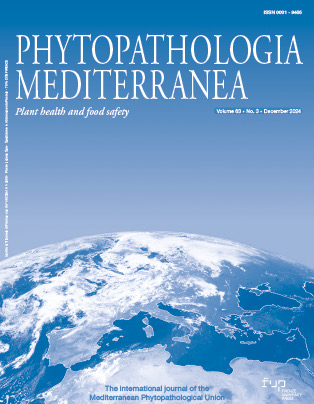Published 2024-12-15
Keywords
- Olea europaea,
- leaf spot,
- fruit rot
How to Cite
Copyright (c) 2024 Meriem Miyassa ACI, Giovanni Enrico AGOSTEO, Sonia PANGALLO, Anna Maria CICCHELLO, Saveria MOSCA, Maria Giulia LI DESTRI NICOSIA, Leonardo SCHENA

This work is licensed under a Creative Commons Attribution 4.0 International License.
Abstract
This paper is the first report of symptoms caused by Alternaria alternata on aboveground organs of olive plants in Italy. On leaves, symptoms included spots and necroses frequently associated with damage caused by the olive thrips (Liothrips oleae). On fruits, symptoms included browning and necroses of pedicels, necroses of fruitlets soon after fruit set, and rot and mummification of mature fruit. Several isolates of A. alternata with identical morphological features and DNA sequences were associated with all the different symptoms. The impacts of A. alternata on olive production can be severe, and infections to fruit pedicels are particularly relevant as they cause severe fruit fall soon after fruit set.
Downloads
References
- Alam T., Munis M.F.H., 2019. Alternaria alternata Causing Leaf and Fruit Spot of Olive in Pakistan. Plant Disease 103: 762–762. https://doi.org/10.1094/PDIS-08-18-1448-PDN DOI: https://doi.org/10.1094/PDIS-08-18-1448-PDN
- Alaux C., 2002. La présenc d’alternaria, une source d’inquiétude pour les oliveraies du Languedoc. Phytoma 552: 24–25 (in French).
- Basım E., Basım H., Abdulai M., Baki D., Öztürk N., 2017. Identification and characterization of Alternaria alternata causing leaf spot of olive tree (Olea europaea ) in Turkey. Crop Protection 92: 79–88. https://doi.org/10.1016/j.cropro.2016.10.013 DOI: https://doi.org/10.1016/j.cropro.2016.10.013
- Chliyeh M., Rhimini Y., Selmaoui K., Touhami A.O., Filali-Maltouf A., … Douira A., 2014. Survey of the fungal species associated to olive-tree (Olea europaea L.) in Morocco. International Journal of Recent Biotechnology 2 (2): 15–32.
- Crnogorac A., Mandić A., Godena S., Petrović E., Matić S., 2023. First report of Alternaria alternata causing bud and blossom blight on olive in Bosnia and Herzegovina. New Disease Reports 48. https://doi.org/10.1002/ndr2.12214 DOI: https://doi.org/10.1002/ndr2.12214
- Lagogianni C.S., Tjamos E.C., Antoniou P.P., Tsitsigiannis D.I., 2017. First report of Alternaria alternata as the causal agent of alternaria bud and blossom blight of olives. Plant Disease 2151. https://doi.org/10.1094/PDIS-04-17-0527-PDN DOI: https://doi.org/10.1094/PDIS-04-17-0527-PDN
- Moral J., De la Rosa R., León L., Barranco D., Michailides T.J., Trapero A., 2008. High Susceptibility of Olive Cultivar FS-17 to Alternaria alternata in Southern Spain. Plant Disease 92: 1252–1252. https://doi.org/10.1094/PDIS-92-8-1252A DOI: https://doi.org/10.1094/PDIS-92-8-1252A
- R Core Team, 2020. R: A language and environment for statistical computing. R Foundation for Statistical Computing, Vienna, Austria. https://www.r-project.org/
- Schena L., Mosca S., Cacciola S.O., Faedda R., Sanzani S.M., … Magnano di San Lio G., 2014. Species of the Colletotrichum gloeosporioides and C. boninense complexes associated with olive anthracnose. Plant Pathology 63: 437–446. https://doi.org/10.1111/ppa.12110 DOI: https://doi.org/10.1111/ppa.12110
- Simmons E.G., 2007. Alternaria: an Identification Manual. APS Press, St. Paul, MN
- Tamura K., Stecher G., Kumar S., 2021. MEGA11: Molecular evolutionary genetics analysis version 11. Molecular Biology and Evolution (F.U. Battistuzzi, ed.), Oxford University Press 38: 3022–3027. https://doi.org/10.1093/molbev/msab120 DOI: https://doi.org/10.1093/molbev/msab120
- Tziros G.T., Karpouzis A., Lagopodi A.L., 2021. Alternaria alternata as the cause of decline and necrosis on olive tree cuttings in Greece. Australasian Plant Disease Notes 16: 7. https://doi.org/10.1007/s13314-021-00422-2 DOI: https://doi.org/10.1007/s13314-021-00422-2
- Wickham H., 2009. ggplot2: Elegant graphics for data analysis. Springer-Verlag New York. https://ggplot2.tidyverse.org. DOI: https://doi.org/10.1007/978-0-387-98141-3
- Woudenberg J.H.C., Seidl M.F., Groenewald J.Z., de Vries M., Stielow J.B., … Crous P.W., 2015. Alternaria section Alternaria : Species, formae speciales or pathotypes? Studies in Mycology 82: 1–21. https://doi.org/10.1016/j.simyco.2015.07.001 DOI: https://doi.org/10.1016/j.simyco.2015.07.001






